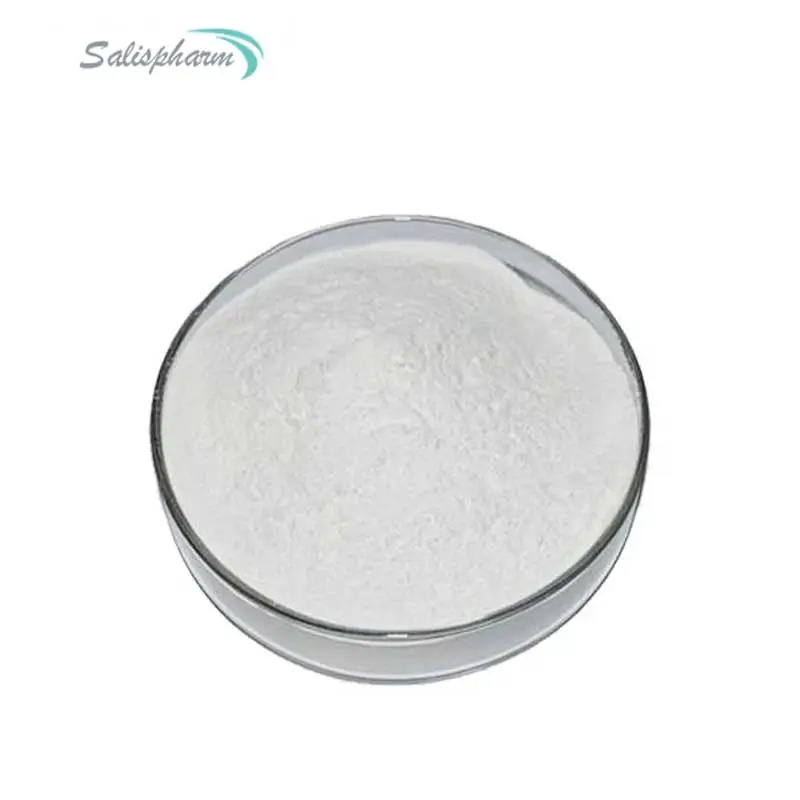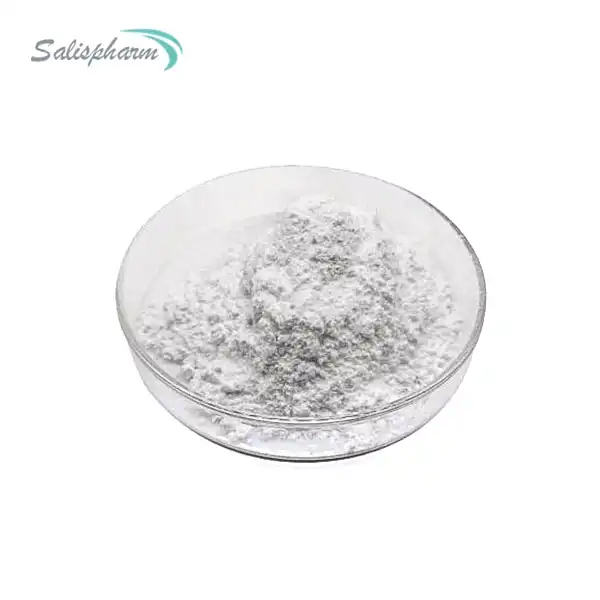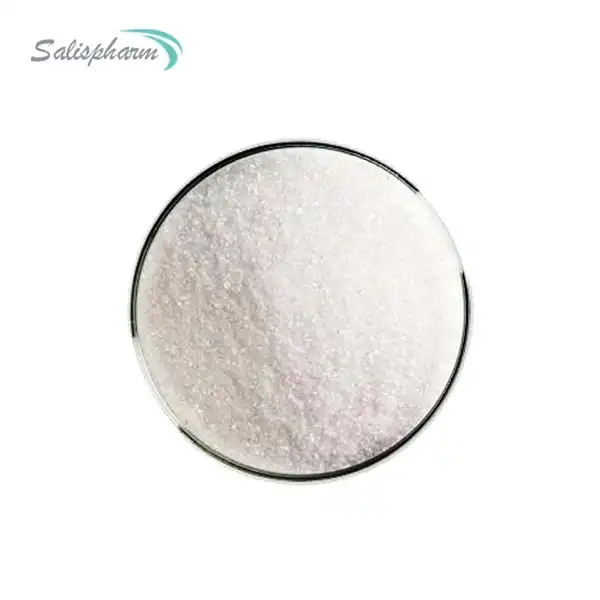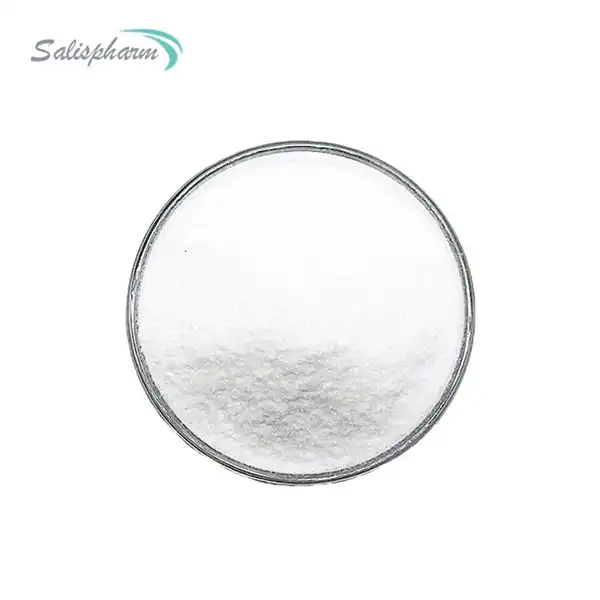Pure aspirin, also known as acetylsalicylic acid, is a versatile and widely used medication that has been a staple in medicine cabinets for over a century. This remarkable compound offers a range of benefits, from pain relief to fever reduction and even potential cardiovascular protection. In this blog post, we'll explore the various effects and applications of pure aspirin, shedding light on its importance in modern healthcare.
How Does Pure Aspirin Powder Work in the Body?
Pure aspirin powder works through a complex mechanism of action that primarily involves inhibiting certain enzymes in the body. When ingested, aspirin is rapidly absorbed in the stomach and small intestine, entering the bloodstream where it begins its work.
The primary mechanism of action for aspirin is the inhibition of cyclooxygenase (COX) enzymes. There are two main types of COX enzymes: COX-1 and COX-2. Aspirin irreversibly inhibits both of these enzymes, but it has a stronger effect on COX-1. These enzymes are responsible for the production of prostaglandins, which are hormone-like substances that play a role in various bodily functions, including pain sensation, inflammation, and fever.
By inhibiting COX enzymes, aspirin reduces the production of prostaglandins throughout the body. This leads to several effects:
1. Pain Relief: Reduced prostaglandin production means that pain signals are less likely to be transmitted to the brain, resulting in analgesic (pain-relieving) effects.
2. Anti-inflammatory Action: Prostaglandins are involved in the inflammatory response. By reducing their production, aspirin helps to decrease inflammation in the body.
3. Fever Reduction: Prostaglandins play a role in regulating body temperature. By inhibiting their production, aspirin can help lower fever.
4. Antiplatelet Effects: Aspirin's inhibition of COX-1 in platelets (blood cells involved in clotting) reduces the production of thromboxane A2, a substance that promotes platelet aggregation. This results in an antiplatelet effect, making the blood less likely to form clots.
The effects of aspirin on the body are dose-dependent. Lower doses (typically 81 mg) are often used for their antiplatelet effects in preventing heart attacks and strokes, while higher doses are used for pain relief and fever reduction.
It's worth noting that the powder form of aspirin allows for faster absorption compared to tablet forms. When pure aspirin powder comes into contact with the moist environment of the stomach or when mixed with water before ingestion, it quickly dissolves and becomes available for absorption. This can lead to a more rapid onset of action, which can be particularly beneficial when quick pain relief is needed.
However, it's important to remember that while pure aspirin powder can be effective, it should always be used under the guidance of a healthcare professional. The correct dosage is crucial, as is understanding any potential interactions with other medications or health conditions.
What Are the Benefits of Using Pure Aspirin for Pain Relief?
Pure aspirin has long been celebrated for its remarkable pain-relieving properties, making it a go-to option for many people seeking relief from various types of discomfort. The benefits of using pure aspirin for pain relief are numerous and wide-ranging, making it a versatile tool in managing different pain conditions.
One of the primary benefits of pure aspirin for pain relief is its effectiveness against a broad spectrum of pain types. It's particularly useful for treating mild to moderate pain, such as headaches, toothaches, menstrual cramps, muscle aches, and joint pain associated with conditions like osteoarthritis. The analgesic effects of aspirin can provide significant relief, allowing individuals to go about their daily activities with reduced discomfort.
Aspirin's pain-relieving action is closely tied to its anti-inflammatory properties. Many types of pain, especially those related to injuries or chronic conditions, involve inflammation. By reducing inflammation, aspirin not only alleviates pain but also addresses one of its root causes. This dual action makes it particularly effective for conditions like rheumatoid arthritis, where both pain and inflammation are present.
Another significant advantage of pure aspirin for pain relief is its rapid onset of action, especially when used in powder form. When taken on an empty stomach or mixed with water, aspirin can begin to provide relief within 15-20 minutes. This quick action can be crucial for those experiencing sudden or intense pain, allowing them to find relief promptly.
Pure aspirin also offers the benefit of being non-narcotic. Unlike opioid pain medications, aspirin does not cause drowsiness or impair cognitive function when used as directed. This means that individuals can use aspirin for pain relief without worrying about it affecting their ability to work, drive, or perform other daily tasks.
For those dealing with chronic pain conditions, aspirin can be a valuable tool in long-term pain management strategies. Its relatively mild side effect profile (when used appropriately) makes it suitable for extended use under medical supervision. This can be particularly beneficial for individuals with conditions like osteoarthritis, who may need ongoing pain management.
Aspirin's unique antiplatelet properties also offer an additional benefit for certain individuals. For those at risk of cardiovascular events, the regular use of low-dose aspirin (as prescribed by a doctor) can provide pain relief while simultaneously offering protection against heart attacks and strokes.
The accessibility and affordability of aspirin are also significant benefits. As an over-the-counter medication, pure aspirin is widely available and generally more cost-effective than many prescription pain relievers. This makes it an accessible option for many people seeking pain relief.
It's important to note that while pure aspirin offers numerous benefits for pain relief, its use should always be approached with caution and under the guidance of a healthcare professional. The appropriate dosage can vary depending on the individual and the specific pain condition being treated. Additionally, aspirin may not be suitable for everyone, particularly those with certain medical conditions or those taking specific medications.
In conclusion, the benefits of using pure aspirin for pain relief are substantial. Its effectiveness against various types of pain, combined with its anti-inflammatory properties, rapid onset of action, and accessibility, make it a valuable option in pain management. Whether dealing with acute pain or managing a chronic condition, pure aspirin can provide significant relief and improve quality of life when used appropriately.
Can Pure Aspirin Be Used to Prevent Heart Attacks?
Pure aspirin has gained significant recognition for its potential role in preventing heart attacks, particularly in individuals at high risk for cardiovascular events. This use of aspirin is based on its unique antiplatelet properties, which can help reduce the risk of blood clots that could lead to heart attacks or strokes.
The preventive use of aspirin in cardiovascular health is primarily based on its ability to inhibit platelet aggregation. Platelets are small blood cells that play a crucial role in blood clotting. While this clotting function is essential for stopping bleeding when we're injured, excessive platelet aggregation can lead to the formation of blood clots in our arteries. These clots can block blood flow to the heart, causing a heart attack, or to the brain, resulting in a stroke.
Aspirin's antiplatelet effect works by irreversibly inhibiting an enzyme called cyclooxygenase-1 (COX-1) in platelets. This inhibition prevents the production of thromboxane A2, a substance that promotes platelet aggregation. By reducing the stickiness of platelets, aspirin makes it less likely for harmful blood clots to form in the arteries supplying the heart and brain.
For individuals who have already experienced a heart attack or stroke, the use of low-dose aspirin (typically 81 mg daily) is often recommended as a secondary prevention strategy. This is because these individuals are at a higher risk of experiencing another cardiovascular event, and the benefits of aspirin therapy generally outweigh the potential risks.
The use of aspirin for primary prevention - that is, in individuals who have not had a heart attack or stroke but are at high risk - is more nuanced and has been the subject of ongoing research and debate in the medical community. Recent studies and guidelines have led to a more personalized approach to aspirin use for primary prevention.
Factors that may influence the decision to use aspirin for primary prevention include:
1. Age: The benefits of aspirin therapy may be more pronounced in middle-aged adults (50-69 years) compared to older adults.
2. Cardiovascular Risk Factors: Individuals with multiple risk factors such as high blood pressure, high cholesterol, diabetes, or smoking may benefit more from aspirin therapy.
3. Bleeding Risk: The potential cardiovascular benefits must be weighed against the increased risk of bleeding, particularly gastrointestinal bleeding, associated with long-term aspirin use.
It's crucial to understand that the decision to use aspirin for heart attack prevention should always be made in consultation with a healthcare provider. They can assess an individual's specific risk factors, overall health status, and potential benefits and risks of aspirin therapy.
For those who are prescribed aspirin for heart attack prevention, adherence to the recommended dosage is crucial. Typically, a low dose of 81 mg (often referred to as "baby aspirin") is used for this purpose. Higher doses are generally not more effective for prevention and may increase the risk of side effects.
It's also important to note that aspirin therapy is not a substitute for other heart-healthy lifestyle measures. A balanced diet, regular exercise, maintaining a healthy weight, not smoking, and managing conditions like high blood pressure and high cholesterol are all crucial components of heart attack prevention.
While the potential of pure aspirin in preventing heart attacks is significant, it's not without risks. Long-term use of aspirin, even at low doses, can increase the risk of bleeding, particularly in the gastrointestinal tract. This is why the decision to use aspirin for prevention must be carefully considered on an individual basis.
In conclusion, pure aspirin can play a role in preventing heart attacks, particularly in individuals at high risk for cardiovascular events. Its antiplatelet properties make it an effective tool in reducing the risk of harmful blood clots. However, the use of aspirin for this purpose should always be under the guidance of a healthcare professional, taking into account individual risk factors and potential benefits and risks. When used appropriately, aspirin can be a valuable component of a comprehensive strategy for heart health and cardiovascular disease prevention.
If you are also interested in this product and want to know more product details, or want to know about other related products, please feel free to contact iceyqiang@aliyun.com.
References
1. Miner, J., & Hoffhines, A. (2007). The discovery of aspirin's antithrombotic effects. Texas Heart Institute Journal, 34(2), 179-186.
2. Patrono, C. (2015). The multifaceted clinical readouts of platelet inhibition by low-dose aspirin. Journal of the American College of Cardiology, 66(1), 74-85.
3. Berger, J. S., et al. (2011). Aspirin for the prevention of cardiovascular events in patients without clinical cardiovascular disease: a meta-analysis of randomized trials. American Heart Journal, 162(1), 115-124.e2.
4. Gaziano, J. M., & Greenland, P. (2014). When should aspirin be used for prevention of cardiovascular events? JAMA, 312(23), 2503-2504.
5. Rothwell, P. M., et al. (2012). Effect of daily aspirin on risk of cancer metastasis: a study of incident cancers during randomised controlled trials. The Lancet, 379(9826), 1591-1601.
6. Sostres, C., & Lanas, A. (2011). Gastrointestinal effects of aspirin. Nature Reviews Gastroenterology & Hepatology, 8(7), 385-394.
7. Schrör, K. (2016). Acetylsalicylic acid. John Wiley & Sons.
8. Vane, J. R., & Botting, R. M. (2003). The mechanism of action of aspirin. Thrombosis Research, 110(5-6), 255-258.
9. Awtry, E. H., & Loscalzo, J. (2000). Aspirin. Circulation, 101(10), 1206-1218.
10. Antithrombotic Trialists' (ATT) Collaboration. (2009). Aspirin in the primary and secondary prevention of vascular disease: collaborative meta-analysis of individual participant data from randomised trials. The Lancet, 373(9678), 1849-1860.










